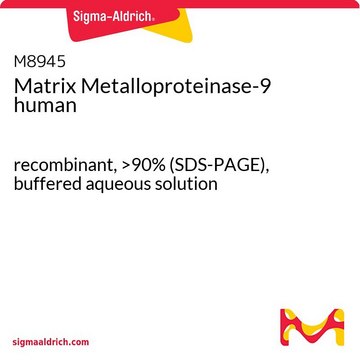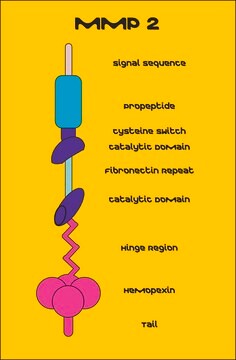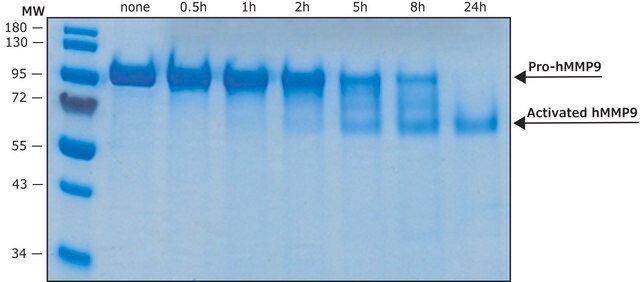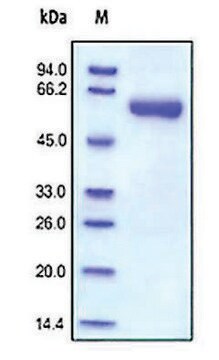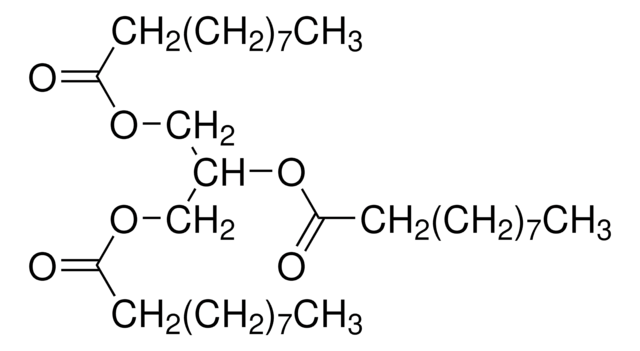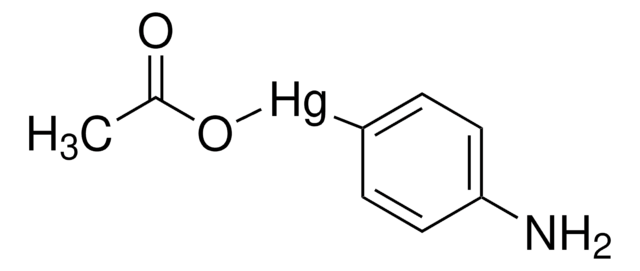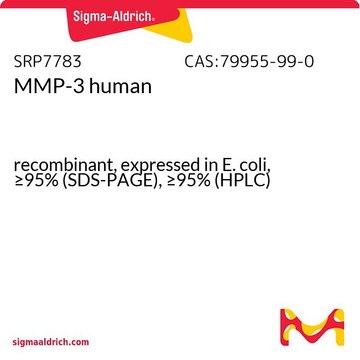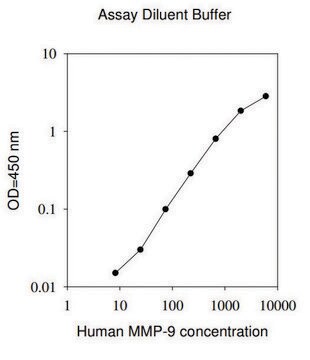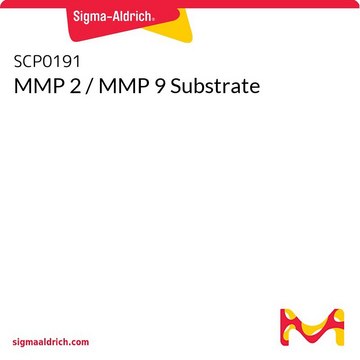추천 제품
생물학적 소스
human
Quality Level
재조합
expressed in HEK 293 cells
분석
≥95% (SDS-PAGE)
형태
liquid
분자량
calculated mol wt 66 kDa
observed mol wt 82 kDa by SDS-PAGE (The protein migrates as a 82 kDa protein on SDS-PAGE due to glycosylation)
농도
≥50 μg/mL
UniProt 수납 번호
응용 분야
cell analysis
배송 상태
dry ice
저장 온도
−20°C
유전자 정보
human ... MMP(4318)
일반 설명
50 μg protein, determined by Bradford. The protein concentration is ≥50 μg/ml. for the lot-specific concentration, see Certificate of Analysis.
생화학적/생리학적 작용
MMP-9 is a member of the matrix metalloproteinase (MMP) family of proteins. Proteins of the MMP family are involved in the breakdown of extracellular matrix in normal physiological processes, such as embryonic development, reproduction, and tissue remodeling, as well as in disease processes, such as arthritis and metastasis. Studies in rhesus monkeys suggest that MMP9 is involved in IL-8 (interleukin-8)-induced mobilization of hematopoietic progenitor cells from bone marrow, and murine studies suggest a role in tumor-associated tissue remodeling. Thrombospondins, intervertebral disc proteins, regulate the effective levels of MMP-2 and -9, which are key effectors of extracellular matrix (ECM) remodeling. MMP-9 degrades various substrates including gelatin, collagen types IV and V, and elastin. MMP-9 is involved in a variety of autoimmune diseases such as systemic lupus erythematosus, rheumatoid arthritis, and multiple sclerosis, and be regarded as a potential therapeutic target.
As with most MMPs, MMP-9 is secreted as an inactive pro-protein which is activated when cleaved by extracellular proteinases. MMP-9 can be cleaved (and thus activated) in vitro using 4-Aminophenylmercuric acetate (APMA), Cat. No. A9563. MMP-9 is secreted from neutrophils, macrophages, and a number of transformed cells, and is the most complex family member in terms of domain structure and regulation of its activity.
Structurally, MMP9 maybe be divided into five distinct domains: a pro-domain which is cleaved upon activation, a gelatin binding domain consisting of three contiguous fibronectin type II units, a catalytic domain containing the zinc binding site, a proline rich linker region, and a carboxyl terminal hemopexin like domain.
As with most MMPs, MMP-9 is secreted as an inactive pro-protein which is activated when cleaved by extracellular proteinases. This product was cleaved and activated in vitro using 4-Aminophenylmercuric acetate (APMA), Cat. No. A9563.
As with most MMPs, MMP-9 is secreted as an inactive pro-protein which is activated when cleaved by extracellular proteinases. MMP-9 can be cleaved (and thus activated) in vitro using 4-Aminophenylmercuric acetate (APMA), Cat. No. A9563. MMP-9 is secreted from neutrophils, macrophages, and a number of transformed cells, and is the most complex family member in terms of domain structure and regulation of its activity.
Structurally, MMP9 maybe be divided into five distinct domains: a pro-domain which is cleaved upon activation, a gelatin binding domain consisting of three contiguous fibronectin type II units, a catalytic domain containing the zinc binding site, a proline rich linker region, and a carboxyl terminal hemopexin like domain.
As with most MMPs, MMP-9 is secreted as an inactive pro-protein which is activated when cleaved by extracellular proteinases. This product was cleaved and activated in vitro using 4-Aminophenylmercuric acetate (APMA), Cat. No. A9563.
기타 정보
This product was pre-activated in vitro using 4-Aminophenylmercuric acetate (APMA). Thus, it is active and ready for use. In order to save our customers from handling hazardous materials, and for environmental saving, the highly toxic and fatal APMA was removed from the final preparation.
물리적 형태
Liquid solution, 0.22 mm filtered, containing 25 mM Tris, 10 mM CaCl2, 0.05% Brij-35
Storage Class Code
12 - Non Combustible Liquids
WGK
WGK 3
Flash Point (°F)
Not applicable
Flash Point (°C)
Not applicable
시험 성적서(COA)
제품의 로트/배치 번호를 입력하여 시험 성적서(COA)을 검색하십시오. 로트 및 배치 번호는 제품 라벨에 있는 ‘로트’ 또는 ‘배치’라는 용어 뒤에서 찾을 수 있습니다.
이미 열람한 고객
Geraldine M Jowett et al.
Nature materials, 20(2), 250-259 (2020-09-09)
Organoids can shed light on the dynamic interplay between complex tissues and rare cell types within a controlled microenvironment. Here, we develop gut organoid cocultures with type-1 innate lymphoid cells (ILC1) to dissect the impact of their accumulation in inflamed
자사의 과학자팀은 생명 과학, 재료 과학, 화학 합성, 크로마토그래피, 분석 및 기타 많은 영역을 포함한 모든 과학 분야에 경험이 있습니다..
고객지원팀으로 연락바랍니다.

